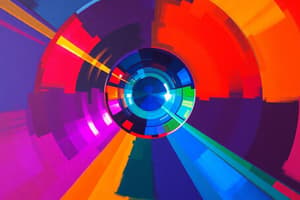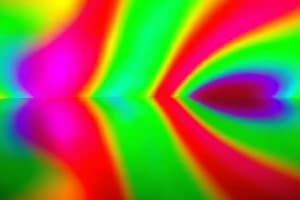Podcast
Questions and Answers
What happens to light rays when they hit a medium at 90° angle?
What happens to light rays when they hit a medium at 90° angle?
- They bend towards the normal
- They bend away from the normal
- They completely reflect back
- There is no refraction (correct)
Total internal reflection can occur when light travels from a less dense medium to a more dense medium.
Total internal reflection can occur when light travels from a less dense medium to a more dense medium.
False (B)
What is the critical angle?
What is the critical angle?
The critical angle is the angle of incidence at which the angle of refraction reaches 90°.
The critical angle for diamonds is _______ degrees.
The critical angle for diamonds is _______ degrees.
Which of the following is a condition for total internal reflection to occur?
Which of the following is a condition for total internal reflection to occur?
Fibre optics utilize the principle of total internal reflection.
Fibre optics utilize the principle of total internal reflection.
Diamonds sparkle due to their high _________ index.
Diamonds sparkle due to their high _________ index.
Match the following terms with their definitions:
Match the following terms with their definitions:
Flashcards
Refraction
Refraction
The bending of light as it passes from one medium to another.
Angle of Incidence
Angle of Incidence
The angle at which light hits a surface, measured from the normal (a line perpendicular to the surface).
Angle of Refraction
Angle of Refraction
The angle at which light bends as it passes from one medium to another, measured from the normal.
Critical angle
Critical angle
Signup and view all the flashcards
Total Internal Reflection
Total Internal Reflection
Signup and view all the flashcards
Refractive Index
Refractive Index
Signup and view all the flashcards
Fiber Optics
Fiber Optics
Signup and view all the flashcards
Diamond Sparkle
Diamond Sparkle
Signup and view all the flashcards
Study Notes
Total Internal Reflection
- Total internal reflection is a phenomenon where light, encountering a boundary between two mediums, reflects back into the first medium instead of refracting into the second medium.
- This occurs when the angle of incidence is greater than the critical angle.
- The critical angle is the angle of incidence at which the refracted angle is 90 degrees.
- Light travels slower in denser mediums.
Angle of Refraction
- Light refracts (bends) when passing from one medium to another at an angle.
- If the angle of incidence is 90 degrees, there will be no refraction.
- Refraction is affected by the refractive index of the mediums.
- Light bends away from the normal when moving from a denser to a less dense medium. The angle of refraction is always greater than the angle of incidence in this case.
Critical Angle
- The angle of refraction continues to increase as the angle of incidence increases.
- Eventually, the angle of refraction becomes 90°.
- The angle of incidence at this point is called the critical angle.
Fibre Optics
- Fibre optics is an application of total internal reflection.
- Used in communication systems (phones, computers, TVs).
- Used in the automotive industry (instrument panels).
- Used in medicine (endoscopes).
Diamonds
- Diamonds sparkle due to total internal reflection.
- Diamonds have a high refractive index, which results in a small critical angle (24.4°).
- This allows a significant amount of incident light to undergo total internal reflection, causing the sparkling effect.
Practice Questions
- When is light travelling at its fastest? (In a vacuum)
- Under what conditions can light be slowed down or sped up? (When moving through different mediums).
- Describe how light changes direction when moving from one medium to another.(Light bends toward or away from the normal).
- What property of a medium is given by its index of refraction? (Density)
- Through which medium does light pass more quickly, one with a refractive index of 2.0 or one with a refractive index of 3.0? (With a refractive index of 2.0).
- What is internal reflection? When does it occur? (Reflection back into the original medium when angle of incidence is greater than the critical angle.)
Solutions
- Light travels fastest in a vacuum.
- Different materials have varying refractive indices; therefore, light will travel at different speeds in different mediums.
- Materials will refract light towards or away from the normal depending on the materials.
- The refractive index measures the density of a material.
- Light travels faster through a material with a lower refractive index.
- Internal reflection occurs when light, incident on a boundary between mediums, is reflected back into the original medium instead of being refracted into the second medium. This happens when the angle of incidence is greater than the critical angle.
Studying That Suits You
Use AI to generate personalized quizzes and flashcards to suit your learning preferences.




